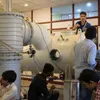In the age of ‘shoebox’ satellites, this space-tech startup by two student entrepreneurs is primed for take-off
This space-tech startup by two 20-year-old student entrepreneurs from BITS Pilani is building a constellation of nanosatellites that can beam down real-time remote sensing data and imagery that can be analysed to make accurate predictions in multiple sectors, including agriculture.

Until recently, space has been the exclusive playground of government space programmes and select large enterprises. But that’s quickly changing, thanks to a surge in demand for ‘shoebox’-sized satellites, or nanosatellites that weigh anywhere between 1 and 10 kg.
In India too, the growing popularity of small satellites that weigh less than 100 kg is opening up the space industry to more players, including educational institutions and startups.
One such startup is Pixxel – a space-tech company that is the brainchild of two 20-year-old student entrepreneurs, Awais Ahmed and Kshitij Khandelwal.
With their shared love for space and technology, the duo started Pixxel in 2018 with the vision to “…build a global space-tech company out of India that would contribute meaningfully towards space exploration”.
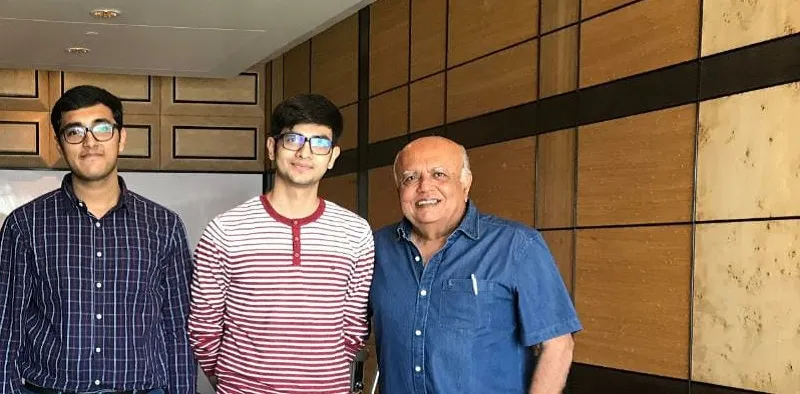
Pixxel Co-founders Kshitij Khandelwal and Awais Ahmed with mentor Dileep Nath, Managing Director, Aaroha Pte Ltd.
For the two undergraduate students of Rajasthan-based BITS Pilani Institute, their “master plan” to achieve this vision is three-fold:
- build a constellation of advanced earth imaging nanosatellites that can provide real-time remote sensing data;
- develop the supporting artificial intelligence (AI)-backed technology to analyse the data collected by these satellites, and make highly accurate data-based predictions in different sectors, such as agriculture and mining, to find effective solutions for existing problems, and;
- use the technology it has developed to map out resources on the Moon, Mars and the asteroid belt to contribute towards the exploration of our solar system.
“The first step towards achieving our vision is building and launching a constellation of the world’s most advanced earth imaging constellation that can beam down data at a level of detail that hasn’t been attempted before,” says Co-founder and Chief Executive Awais Ahmed.
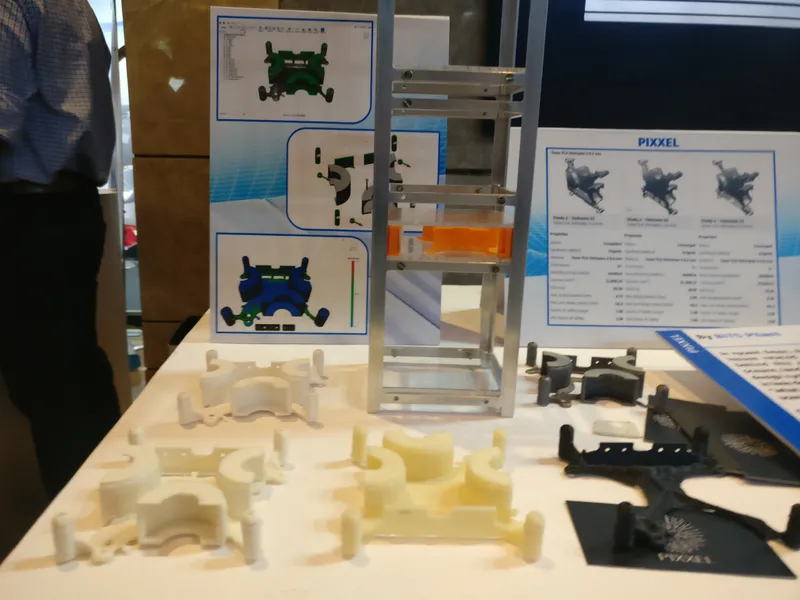
A display of Pixxel's satellite structure and 3D-printed satellite parts.
Doing the new in the field of space-tech
Both Awais and Kshitij were certain that they wanted to create “…something innovative that hasn’t yet been done in India or the west” in the field of space technology.
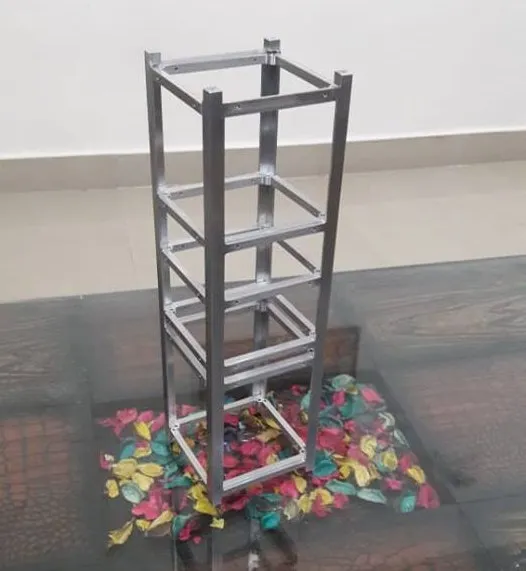
The outer skeleton of the satellite. Pixxel's nanosatellite weighs less than 10 kg, which is important as the weight of the satellite determines the launch cost.
Enter nanosatellites.
These small satellites, when compared with the traditional, large satellites, are relatively low cost, easier to manufacture, light weight, and have the ability to provide near real-time remote sensing and surveillance data for monitoring and forecasting needs in the commercial and civil sectors.
“The same tech that enables traditional satellites to map the earth will be used to map minerals, water, and other resources on the Moon, Mars, and even the asteroid belt as humanity strives to explore the solar system and solve a range of global problems,” says Co-founder Kshitij Khandelwal.
Armed with a multidisciplinary team of around 40 people with expertise in artificial intelligence, engineering, management, and economics, the Pixxel team is currently manufacturing the first of its satellites at its Chennai-based manufacturing site.
“Once that (first satellite) is done and perfected, we can have newer satellites rapidly in three months. We can start launching five new satellite every six months after that. By 2021, our first constellation will be complete which we will keep on expanding and replacing,” says Awais.
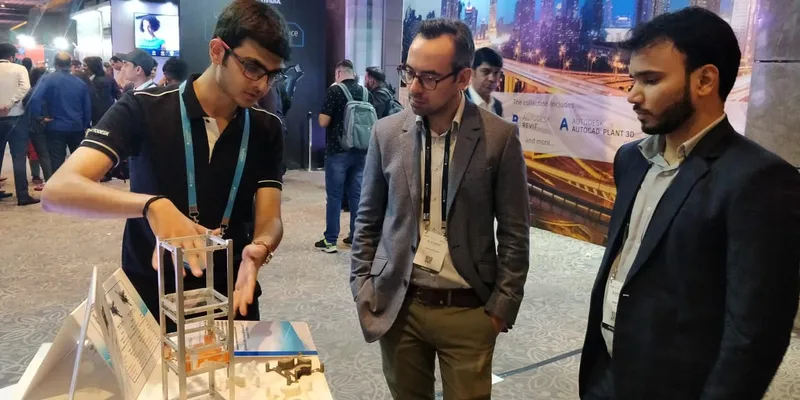
Pixxel Co-founder Awais Ahmed presenting the space-tech company's nanosatellite at the AutoDesk Expo 2018.
The early-stage startup, which claims it has enough funds for the manufacture and launch of its prototype satellite, says it has the backing of a growing list of mentors who comprise BITS Pilani alumi. The startup did not disclose the individual or total investment values it has received from its angels.
Pixxel’s first satellite is expected to be ready for launch by the end of the year. By early next year, the nanosatellite will be delivered into the earth’s lower orbit, and will beam down near real-time sensing data at an ‘unprecedented’ level of detail, Pixxel co-founders say.
Also watch: Pixxel Co-founders Awais Ahmed and Kshitij Khandelwal in conversation with YourStory's Alok Soni about building a constellation of advanced earth imaging satellites from India.
Nanosatellites: fastest-growing smallsat segment
To be clear, private companies developing CubeSats, or miniature satellites, have been able to demonstrate success in delivering services equivalent to that of the large, traditional satellites that are operated by government space agencies.
Going forward, industry experts expect the nanosatellite segment to be the fastest growing within the small satellite market, given their ability to transmit high-resolution remote sensing data from multiple locations for multiple domains in the commercial and civil sectors.

Pixxel's 3D-printed satellite parts allows for faster production time and reduced costs.
Kshitij, who saw first-hand the challenges that his own father faced as a farmer, says remote sensing from satellites and drones combined with advanced computational techniques such as AI can effectively resolve the problems afflicting India’s agriculture industry.
These problems range from irregular rainfall, to lack of irrigation, to pest infestation, among others. The solutions, with the data collected from a Pixxel satellite, could range from predictions related to crop yields, to weather, to crop health.
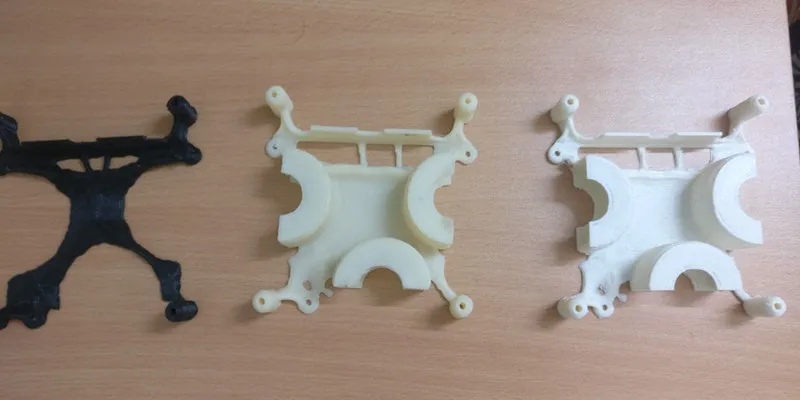
The outer skeleton of the satellite. Pixxel's nanosatellite weighs less than 10 kg, which is important as the weight of the satellite determines the launch cost.
Pixxel also reached out to potential customers in the agricultural, mining, and petroleum sectors to identify how satellite imagery and data can be used to tackle inherent problems in these fields.
“We talked to our customers, the companies. Based on their inputs, we understood the type of data we wanted. We realised that we wanted to tackle the bigger challenges, and the bigger challenges were food security, sustainable development, illegal mining, and deforestation, among others,” Kshitij says.
Pixxel is currently also working with an early customer on a nationwide mapping project using satellite imagery.
Overcoming challenges
Speaking with customers directly has also helped address a key challenge Pixxel faced early on: designing the payload, the core functionality of the satellite.
“Initially, we were just going with the idea of everything and there was no background to it. But over the course of the last one year, we’ve gone through a lot of customer surveys and we’ve understood what the requirement is for the kind of data that we want to work with,” says Awais.
Pixxel’s mentors, who include BITS Pilani alumni, academia, and researchers in different fields across the globe, also steered the team on the right path when they faced initial difficulties in designing the payload, and also with raising capital, the co-founders say.
“Regarding mentors and development partners, it is easy once they see that you are technically adept and you are serious about it. The real bottleneck about being student entrepreneurs was funding, but we just had to find the people who believed we can do it.”
Proving their mettle
To be sure, this duo have already proved themselves in multiple national and global space industry competitions, including the one run by tech entrepreneur Elon Musk’s rocket and spacecraft company.
In 2017, both Awais and Kshitij were among the select few who formed the Hyperloop India team at the international Hyperloop Pod Competition run by Musk’s SpaceX.
Awais, who was one of the earliest founding members at Hyperloop India, led the levitation and braking subsystems team for the competition, while also helping with the manufacturing, outreach, and fundraising activities. Kshitij, who had previously worked at the Solid State Physics Laboratory, Defense Research and Development Organisation (DRDO), was part of the control systems team at Hyperloop India.
At the time, the duo worked with other Hyperloop Team India members to build a Hyperloop pod that could travel at the speed of sound. They were one of the finalists who presented the pod to Elon Musk.

Awais Ahmed, Co-founder of Pixxel, with tech entrepreneur Elon Musk in the background at the SpaceX Hyperloop Pod Competition in 2017.
This was no mean feat for the India team considering the lack of literature on the Internet on building something like this and also, given the scarce availability of mentorship in India at the time.
If anything, their success at the Hyperloop Pod competition gave them the much-needed confidence to pursue their shared dream of building something ‘meaningful’ from India for the world in the field of space technology.
“We felt that if we could put together something as complicated as a Hyperloop power vehicle, then we can surely go on to build satellites,” recalls Awais.
Indeed the successful launch of Pixxel’s first satellite early next year may well cement its place among the few but growing list of homegrown, private space-tech startups to watch out for. As Awais emphasises,
“The important thing is we are not doing this just because it is cool. We’ve asked customers about their needs; we know the data they need, and based on that, we’ve designed the satellite.”
Also watch: this video below on the use case of Pixxel nanosatellites in agriculture.



